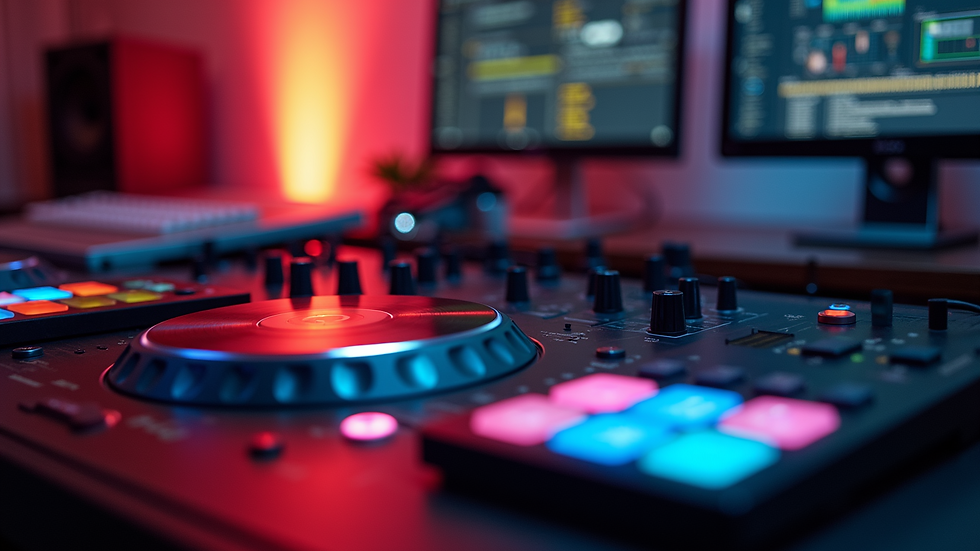Mastering Essential Music Production Techniques
- allblaqstarr
- Sep 29
- 3 min read
Music production is an exciting journey. Whether you want to create beats, record vocals, or mix tracks, mastering the basics is key. I’ve learned that starting with simple, clear steps helps build confidence and skill. In this post, I’ll share practical advice and techniques that anyone can use to improve their music production.
Beginner Music Production Tips to Get You Started
Starting out can feel overwhelming. There are many tools, software, and terms to learn. But you don’t need to know everything at once. Focus on these beginner music production tips to build a strong foundation:
Choose the right Digital Audio Workstation (DAW): Popular options include Ableton Live, FL Studio, and Logic Pro. Pick one that fits your style and budget.
Learn basic music theory: Understanding scales, chords, and rhythm helps you create better melodies and harmonies.
Use quality headphones or monitors: Good sound equipment lets you hear details clearly.
Start with simple projects: Create short loops or beats before tackling full songs.
Experiment with sounds: Try different instruments, samples, and effects to find your unique style.
By following these tips, you’ll avoid common beginner mistakes and enjoy the creative process more.

Understanding the Music Production Workflow
A clear workflow keeps your sessions organized and productive. Here’s a simple breakdown of the music production process:
Idea and Composition: Start with a melody, chord progression, or rhythm. Use a MIDI keyboard or draw notes in your DAW.
Sound Design: Choose or create sounds that fit your idea. This could be synthesizers, drum samples, or recorded instruments.
Arrangement: Structure your song by arranging sections like intro, verse, chorus, and outro.
Mixing: Balance levels, pan instruments, and add effects like reverb or compression to polish the sound.
Mastering: Finalize the track by enhancing loudness and clarity for distribution.
Each step builds on the previous one. Take your time and focus on one stage before moving on.

What are the techniques of music studio?
In a music studio, several techniques help bring your ideas to life. Here are some essential ones I use regularly:
Layering: Combine multiple sounds to create a fuller texture. For example, layering different drum samples can add depth to your beat.
EQ (Equalization): Adjust frequencies to make instruments fit well together. Cut unwanted bass from vocals or boost highs on a snare drum.
Compression: Control dynamics by reducing volume peaks. This makes your track sound more consistent and professional.
Automation: Change effects or volume over time to add movement and interest.
Sampling: Use snippets of existing recordings creatively. This can add unique character to your music.
Mastering these techniques takes practice, but they are the building blocks of professional-sounding tracks.

Tips for Effective Mixing and Mastering
Mixing and mastering are crucial for making your music sound polished. Here are some tips to improve these stages:
Mix in a treated room or use headphones: This helps you hear the true sound without room reflections.
Use reference tracks: Compare your mix to professional songs in the same genre.
Keep your mix simple: Avoid overcrowding the frequency spectrum. Give each instrument its own space.
Check your mix on different systems: Listen on headphones, car speakers, and phone speakers to ensure it sounds good everywhere.
Master with subtlety: Avoid over-compressing or boosting too much. The goal is to enhance, not change, the mix.
These tips help your music translate well across all listening environments.
How to Stay Creative and Keep Improving
Creativity is the heart of music production. Here’s how I stay inspired and keep growing:
Set small goals: Finish a beat or remix every week to build momentum.
Collaborate with others: Working with different artists brings fresh ideas.
Learn from tutorials and courses: There’s always something new to discover.
Take breaks: Step away from your project to return with fresh ears.
Experiment boldly: Don’t be afraid to try new genres, sounds, or techniques.
Remember, every producer started as a beginner. Keep practicing and enjoy the process.
If you want to dive deeper into professional music production techniques, check out resources and services that can guide you further.
Mastering these beginner music production tips will set you on the right path. With patience and practice, you’ll create music that truly reflects your style and passion. Keep exploring, keep creating, and most importantly, have fun making music!



Comments